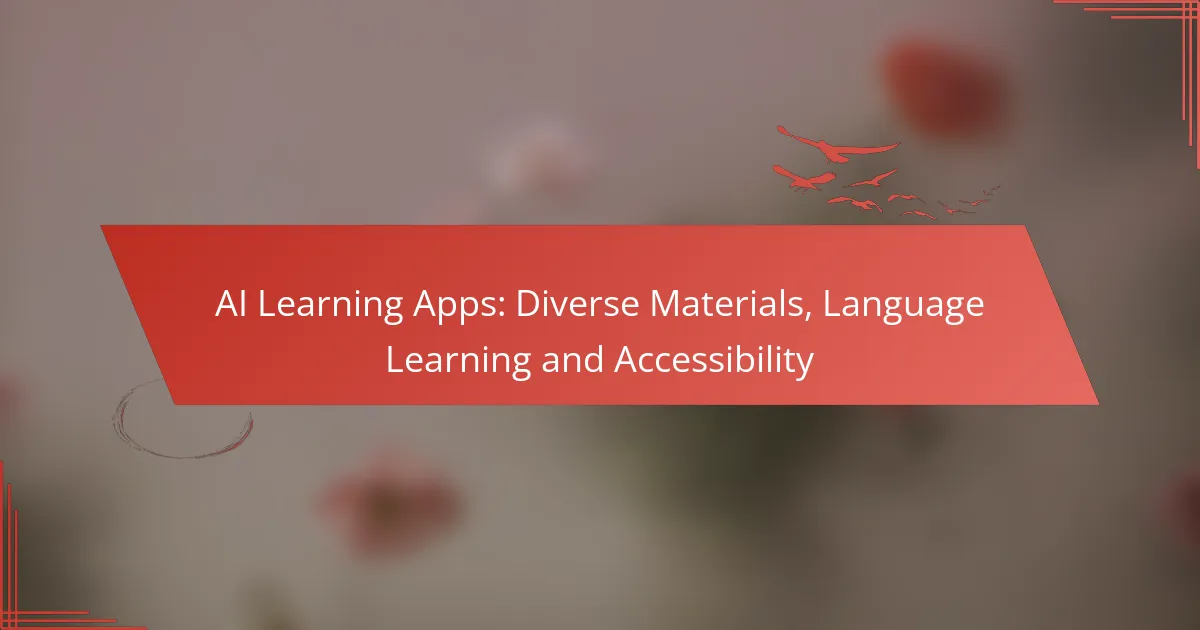Online learning platforms have revolutionized professional development by offering a diverse array of courses tailored to various fields and learning preferences. With flexible learning options and engaging interactive elements, these platforms not only enhance skill acquisition but also foster a sense of community among learners. By incorporating different content types such as video courses, webinars, and podcasts, they cater to individual needs and keep users motivated throughout their educational journey.

What Are the Best Online Learning Platforms for Professional Development?
The best online learning platforms for professional development offer a diverse range of courses, flexibility in learning, and opportunities for skill enhancement. These platforms cater to various fields and provide resources that can help individuals advance their careers effectively.
LinkedIn Learning
LinkedIn Learning is a subscription-based platform that provides access to thousands of courses across various professional fields. Users can learn at their own pace and receive personalized course recommendations based on their career interests and skills.
One key feature is the ability to earn certificates upon course completion, which can be showcased on LinkedIn profiles. This can enhance visibility to potential employers and demonstrate commitment to professional growth.
Coursera
Coursera partners with universities and organizations to offer courses, specializations, and degrees in a wide array of subjects. Many courses are free to audit, while certificates and degrees typically require a fee.
Coursera’s offerings include professional certificates from recognized institutions, which can significantly boost a resume. The platform also provides financial aid options for eligible learners, making it accessible to a broader audience.
Udacity
Udacity focuses on technology and business skills, offering “Nanodegree” programs that are designed in collaboration with industry leaders. These programs are intensive and often include real-world projects to enhance learning.
While Udacity’s courses can be more expensive than other platforms, they are highly regarded for their quality and relevance to current job markets. This makes them a worthwhile investment for those looking to pivot into tech-related fields.
edX
edX offers a wide range of courses from top universities and institutions, allowing users to learn at their own pace. Many courses can be audited for free, while verified certificates are available for a fee.
edX also provides MicroMasters programs and professional certificates, which can help learners gain specialized knowledge and skills that are recognized by employers. The platform’s focus on academic rigor makes it suitable for those seeking in-depth learning.
Skillshare
Skillshare is a platform that emphasizes creative skills and practical learning through project-based courses. It operates on a subscription model, giving users unlimited access to a vast library of classes.
This platform is ideal for individuals looking to enhance their creative abilities, such as design, photography, and writing. However, it may not be as suitable for those seeking formal qualifications or in-depth technical training.

How Do Online Learning Platforms Enhance Engagement?
Online learning platforms enhance engagement by incorporating various interactive elements that keep learners motivated and involved. These features create a dynamic learning environment that encourages participation and fosters a sense of community among users.
Interactive Content Features
Interactive content features, such as quizzes, simulations, and multimedia presentations, actively involve learners in the educational process. These elements allow students to apply what they have learned in real-time, reinforcing knowledge retention and understanding.
For example, a platform might offer a virtual lab where learners can conduct experiments, providing hands-on experience that traditional methods lack. This type of engagement can significantly enhance the learning experience, making it more enjoyable and effective.
Gamification Elements
Gamification elements, such as points, badges, and leaderboards, motivate learners by introducing game-like dynamics into the educational experience. These features encourage healthy competition and reward progress, making learning more appealing.
Platforms may implement challenges or quests that learners can complete to earn rewards, which can lead to increased participation and commitment. By incorporating these elements, platforms can transform mundane tasks into exciting activities that drive engagement.
Community Forums
Community forums provide a space for learners to connect, share ideas, and seek help from peers and instructors. This interaction fosters a sense of belonging and support, which can enhance motivation and engagement in the learning process.
Active participation in forums can lead to collaborative learning experiences, where users exchange knowledge and resources. Encouraging learners to ask questions and share insights can create a vibrant learning community that benefits all members.

What Types of Content Are Available on Online Learning Platforms?
Online learning platforms offer a diverse range of content types to cater to various learning preferences and professional development needs. These include video courses, live webinars, podcasts, and text-based resources, each providing unique benefits and engagement opportunities.
Video Courses
Video courses are one of the most popular formats on online learning platforms, allowing learners to engage with content visually and audibly. These courses often include lectures, demonstrations, and interactive elements, making complex subjects more accessible.
When selecting video courses, consider the length and depth of the material. Many courses range from a few hours to several weeks, with some offering certificates upon completion. Look for platforms that provide previews or sample lessons to gauge the course quality before enrolling.
Live Webinars
Live webinars provide real-time interaction between instructors and participants, enhancing engagement and allowing for immediate feedback. These sessions often cover current trends or specific topics and may include Q&A segments to address learner inquiries.
To maximize the benefits of live webinars, check the schedule and time zone compatibility, especially if you are in a different region. Participating in these sessions can deepen your understanding and provide networking opportunities with both instructors and peers.
Podcasts
Podcasts offer a flexible way to consume educational content, allowing learners to listen while commuting or multitasking. Many online learning platforms feature podcasts that delve into industry insights, expert interviews, and practical tips.
When choosing podcasts, look for those that align with your interests and professional goals. Consider subscribing to a few series to stay updated on relevant topics and trends in your field, making it easy to integrate learning into your daily routine.
Text-Based Resources
Text-based resources, including articles, eBooks, and study guides, provide detailed information that learners can reference at their own pace. These materials are often rich in data, examples, and case studies, making them valuable for in-depth understanding.
To effectively utilize text-based resources, create a reading schedule to manage your time and ensure you cover essential topics. Bookmark or highlight key sections for quick reference, and consider supplementing your reading with other formats for a well-rounded learning experience.

What Are the Pricing Models for Online Learning Platforms?
Online learning platforms typically utilize various pricing models to cater to different user needs and preferences. The most common models include subscription-based options, one-time purchases, and free trials, each offering distinct advantages and considerations.
Subscription-Based Models
Subscription-based models charge users a recurring fee, often monthly or annually, granting access to a wide range of courses and materials. This model is advantageous for learners who wish to explore multiple subjects without committing to individual course costs.
Prices for subscriptions can vary significantly, typically ranging from $10 to $50 per month, depending on the platform and the breadth of content offered. Users should consider the total cost over time and the potential for unlimited access to resources.
One-Time Purchase Options
One-time purchase options allow users to pay a single fee for lifetime access to a specific course or learning material. This model is ideal for those who prefer to focus on a particular subject without ongoing financial commitments.
Prices for one-time courses generally range from $20 to several hundred dollars, depending on the course depth and instructor expertise. It’s essential to evaluate the course content and reviews before making a purchase to ensure it meets your learning objectives.
Free Trials
Free trials provide users with temporary access to a platform’s offerings, typically lasting from a week to a month. This model allows potential subscribers to evaluate the quality of content and features before committing financially.
When considering a free trial, be mindful of automatic billing that may occur after the trial period ends. Set reminders to cancel if you decide not to continue, and take full advantage of the trial to assess the platform’s suitability for your learning goals.

How to Choose the Right Online Learning Platform?
Choosing the right online learning platform involves evaluating your specific needs, such as content variety, engagement features, and professional development opportunities. Consider factors like course offerings, user interface, and support services to find a platform that aligns with your learning goals.
Assessing Content Variety
Content variety is crucial when selecting an online learning platform, as it determines the breadth of topics and formats available. Look for platforms that offer a mix of video lectures, interactive quizzes, and downloadable resources to cater to different learning styles.
Consider platforms that provide courses across various subjects, from technical skills to soft skills. A diverse catalog enhances your learning experience and keeps you engaged. For instance, platforms like Coursera and Udemy offer thousands of courses, while others may focus on niche areas.
Evaluating User Engagement Features
User engagement features significantly impact the effectiveness of online learning. Look for platforms that incorporate interactive elements like discussion forums, live Q&A sessions, and gamification to foster a sense of community and motivation.
Additionally, consider platforms that offer progress tracking and personalized learning paths. These features help you stay accountable and allow for adjustments based on your pace and preferences. For example, platforms like LinkedIn Learning provide tailored recommendations based on your skills and interests.



